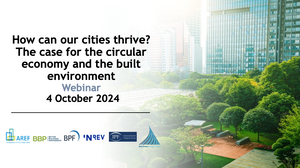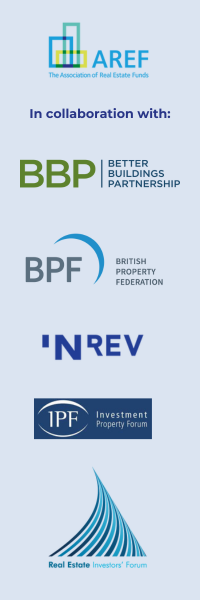On Friday 4th October, AREF, in collaboration with BBP, BPF, INREV, IPF and REIF, hosted a webinar focused on the urgent need for sustainable urban development. As urban areas expand, the balance between growth and sustainability becomes increasingly critical. The session brought together thought leaders to explore how Doughnut Economics and the principles of the circular economy can shape the future of our cities, ensuring they respect both social and planetary boundaries.
Doughnut Economics: A New Approach to Urban Growth
The concept of Doughnut Economics, advocates for an economic model that meets the needs of all within the means of the planet. Chris Brown, Managing Director of Climatise and co-founder of the London Doughnut Economy Coalition, highlighted this transformative approach during his presentation. He stated:
"The idea is to create a city where we are meeting the needs of everyone without overshooting the ecological limits."
This vision emphasises that cities should not only focus on economic growth but also consider the well-being of their inhabitants and the health of the planet.
Amsterdam’s Climate Action Plan: A Model for Sustainability
Lianne Hulsebosch, Sustainable Urban Development Strategist for the City of Amsterdam, shared insights on the city’s comprehensive Climate Action Plan. Amsterdam is at the forefront of integrating sustainability into urban planning, with initiatives designed to enhance resilience against climate change while promoting social equity. Hulsebosch emphasised:
"Our approach is about integrating sustainability into every aspect of urban life, from transportation to energy use and community engagement."
She explained how the city is working to achieve its climate goals through innovative solutions that respect both social and environmental limits.
The ESG Perspective on Thriving Cities
Alice Teboul, ESG Manager at Columbia Threadneedle and member of the AREF ESG & II Committee, shared a real estate perspective on fostering thriving cities. In her presentation, she emphasised three key areas: decarbonisation, social value, and biodiversity. She noted the crucial role that environmental, social, and governance (ESG) factors play in real estate investment and urban development:
"Investors are increasingly looking at how their portfolios can contribute to building sustainable communities. It’s not just about returns; it’s about creating value for society and the environment."
Teboul elaborated on decarbonisation efforts within the real estate sector, emphasising the importance of reducing carbon footprints to combat climate change. She also highlighted the significance of fostering social value, ensuring that developments benefit local communities, and maintaining biodiversity to support healthy ecosystems.
Insights from London’s Doughnut City Portrait
The webinar also featured Chris Brown discussing the "London Doughnut City Portrait - Edition One," which provides a snapshot of how London measures against the Doughnut Economics framework. He articulated the importance of understanding the city’s current status in relation to its social and environmental objectives:
"We need to understand where we are before we can build where we want to go. The Doughnut model helps us visualise the balance we need to achieve this."
This perspective encourages policymakers to make informed decisions that promote sustainable growth while addressing pressing social issues.
A Call to Action for Sustainable Urban Development
The session was expertly moderated by Melville Rodrigues of Apex Group, who guided the discussion and emphasised the urgency of integrating these concepts into urban planning:
"The challenge is immense, but so are the opportunities. By adopting Doughnut Economics and circular economy principles, we can create cities that thrive."
Conclusion: Shaping the Future of Our Cities
The webinar provided a wealth of insights into the principles of Doughnut Economics and the transformative potential for urban development. It became clear that a collaborative approach is vital in fostering sustainable cities that respect social and planetary boundaries.
We extend our thanks to all the speakers and participants for their contributions to this critical discussion.
The recording, slides and audio-only podcast version of the webinar is available to all, below:
Watch the Recording:
View the Slides:

Listen to the Recording:
Useful Links:
Event: Big Ben Bites : What the Doughnut means for London
Date: Thu, Nov 7 • 09:30 GMT
Location: Regent's Place, 17-19 Triton Square, London, NW1 3BF
More info and book



